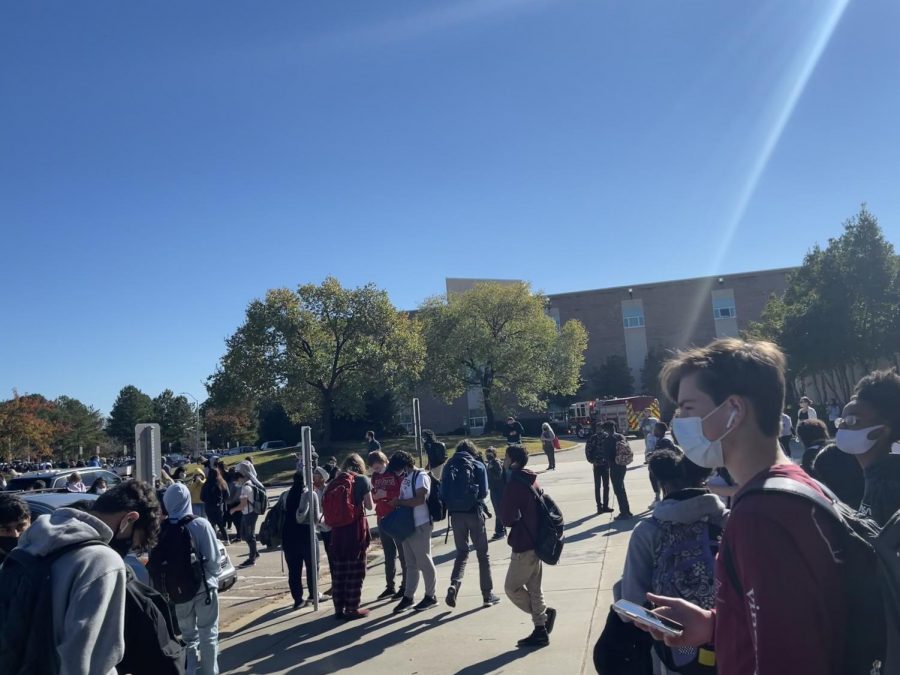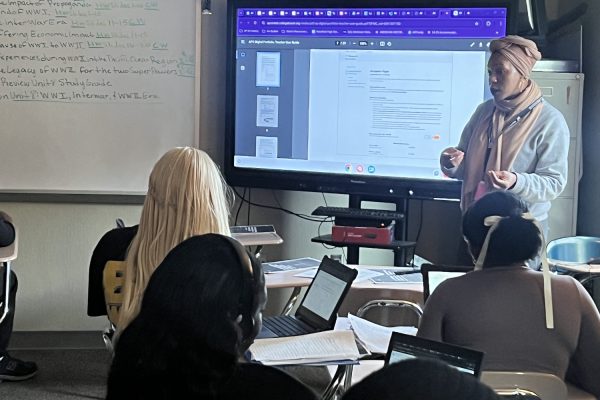Fire alarms led to disciplinary action against students
Students wait in front of a firetruck on November 8 after Wakefield High School fire alarm was pulled during lunch.
The first two weeks of November held many fire alarms for the students and staff at Wakefield High School (WHS). Between vaping in the bathrooms and students deciding to pull the alarms, 5 full evacuations of the school buildings took place.
Principal Malik Bazzell has been very involved in the fight against the incidents.
“I think that the school handled each matter swiftly and to the best of our abilities,” Bazzell said. “Hopefully, anyone thinking of committing such pranks will be deterred based on the fact each offender was caught and given severe consequences.”
What is sparking these incidents in our communities? Are students less disciplined now that we have returned to the school building, or is this something else altogether?
Beth Keefer is among the many administrators working to keep students and faculty safe during these unexpected interruptions.
“We have over 2000 students who show up each day and do their best to learn and grow as part of our community,” Keefer said. “I think these incidents reflect the challenges that schools across the nation are facing as students transition back to fully in-person instruction.”
WHS hasn’t had too many issues like this in the past few years. With the return of in-person education, schools are finding ways to offer support to their students. The goal of this is not only to provide students with a safe place to learn and express themselves but also to prevent the mindset that causes students to act out in these ways.
“Students have a lot of feelings and a lot to process during this time, and not everyone makes great decisions as they go through that process,” Keefer said. “We want each of our students to know that staff is available and willing to assist them if they are struggling.”
Since not everyone will acknowledge this resource, the school has also implemented ways to directly prevent students from intentionally or unintentionally triggering the alarms.
“We are increasing our visibility in the hallways to make sure students are where they need to be and are engaged in learning,” Keefer said. “We are also asking teachers to monitor who is out of their rooms at any time.”
The administrators are also hoping that the actions they have taken to punish those few students responsibly will deter students from partaking in this trend in the future.
“We are being diligent about making sure we catch the offenders to serve as a warning to others that disrupting the entire school will significantly impact your future in a negative way,” Bazzell said.
Many students have also been bothered by the incidents. They are upset that their education and their routines have been interrupted for such a cause.
Gabriella Turchetti is the Student Body Vice President and frequently interacts with students at the school in both a professional and personal manner.
“My peers have also been annoyed with the recent events,” Turchetti said. “It is disruptive when it takes us out of class and alternates the schedule.”
During the chaos of these events at WHS, students started to circulate rumors about the school shutting off the alarms to prevent further incidents.
While the rumors are unverified, many students believe them to be true.
“I was uncertain how to feel about the school’s reaction to the recurring incidents,” Turchetti said. “I don’t believe turning off the fire alarms to prevent the intended defiance of creating a ruse was the correct response.”
Not all students believed these rumors to be true and expressed appreciation for the reactions of school administration.
The Student Body President Brooke Eisenberg thinks that the school handled these incidents in an orderly fashion.
“I do not think the school could have done much different,” Eisenberg said. “We need the fire alarms to be accessible in case of emergency and it is sad [that] students are using a safety matter as a joke.”
It’s important to note that jokes like these not only waste the time of students and staff who are hard at work but also affect first responders like firefighters.
“All this does is cause a loss of learning for students and wasting the time of firefighters,” Eisenberg said.
At first, many students saw the fire alarms as a possible trend, but with quick action on the school’s part, everyone was able to put these events in the past.
“I do not think the trend will continue,” Eisenberg said. “It was a few days fad and I think students realized the severity of it.”










Arthur Sockolof • Jan 13, 2022 at 6:23 pm
Isn’t it interesting how the anti-civil events by a ‘few’ people at WHS negatively affect the lives of the student body in the same manner as the anti-civil events at the national level affect the national body, just sayin’!!!!
Better than a good piece, Erin!
Pop-pop
Maddie Policastro • Dec 2, 2021 at 6:03 pm
Love this, Erin! Very well done 🙂